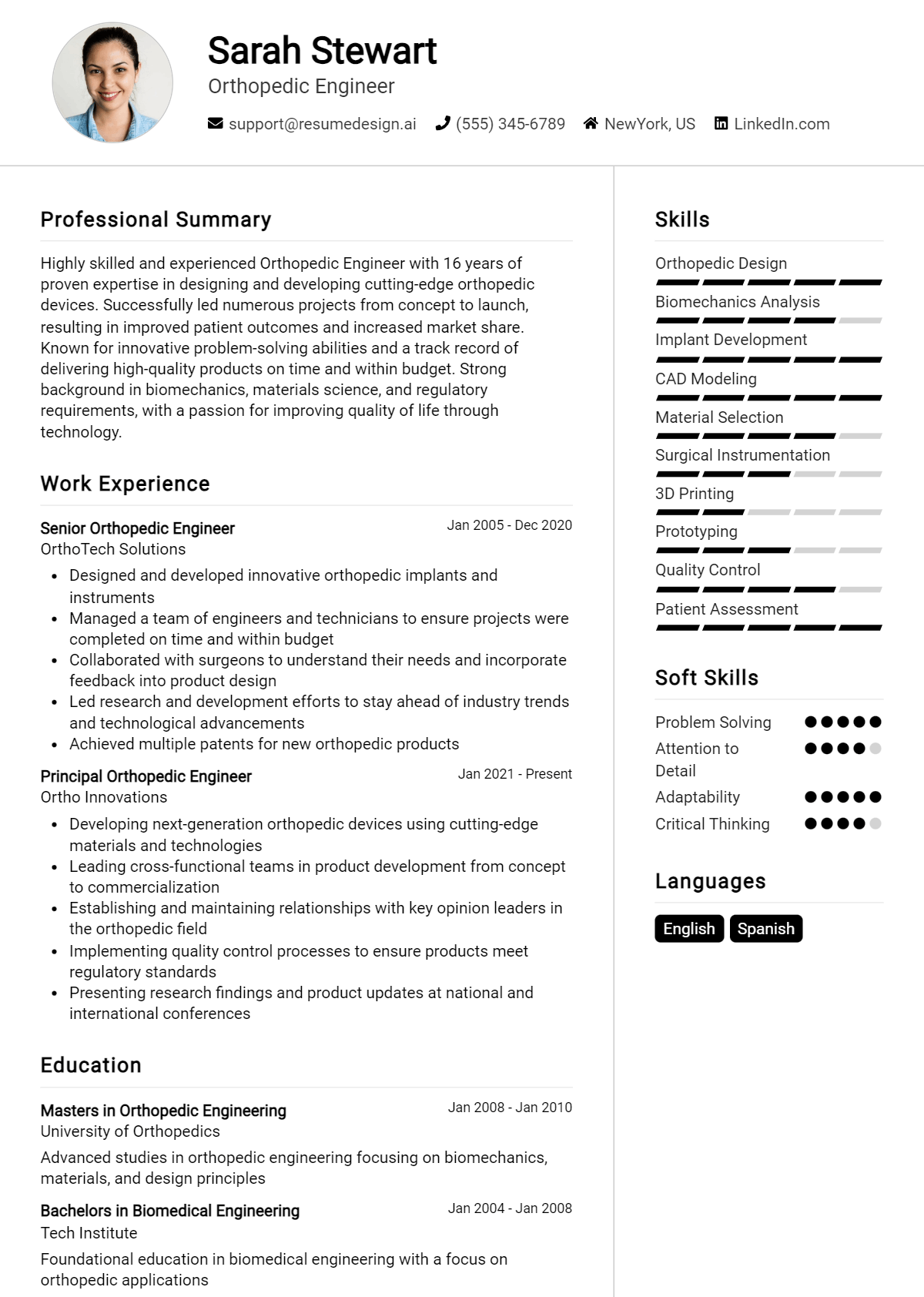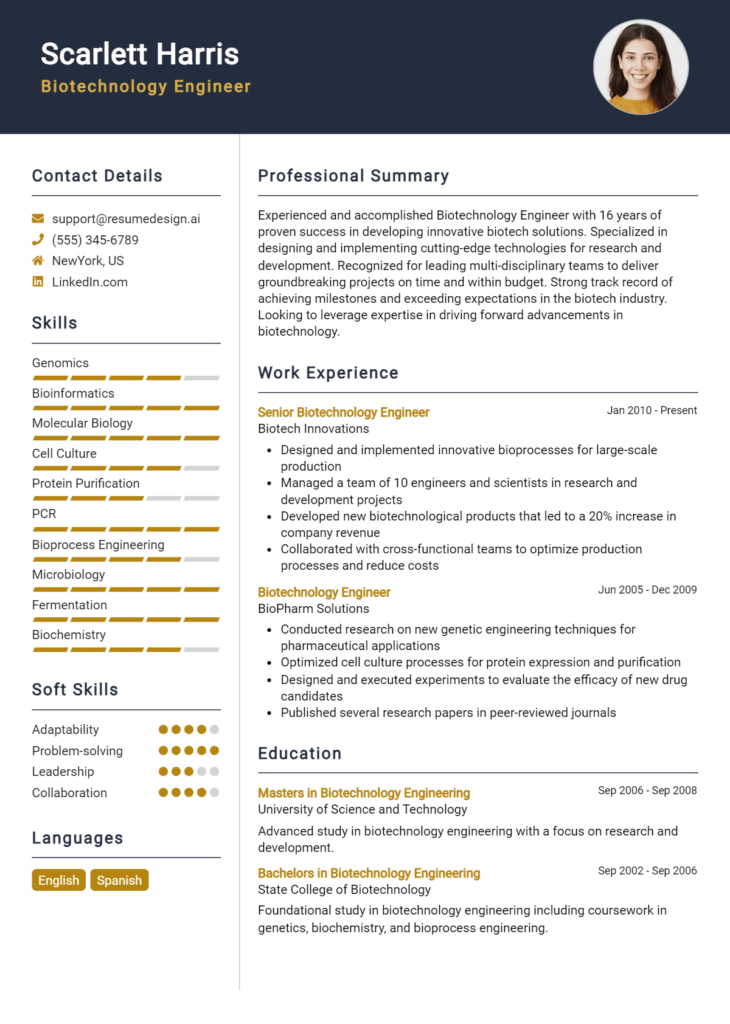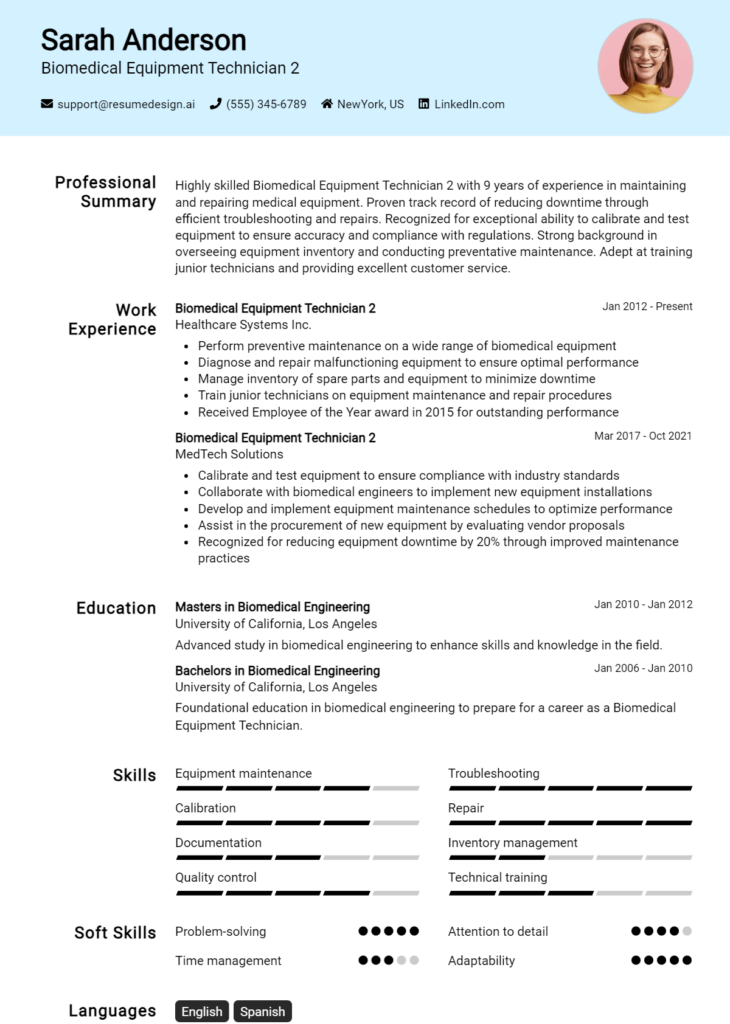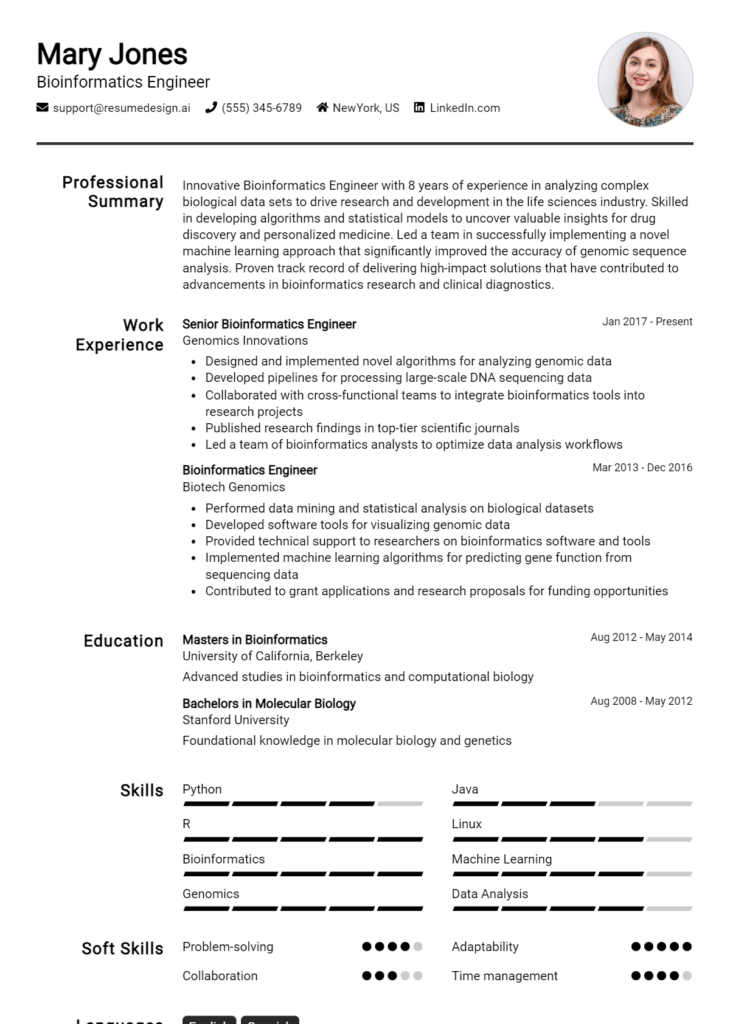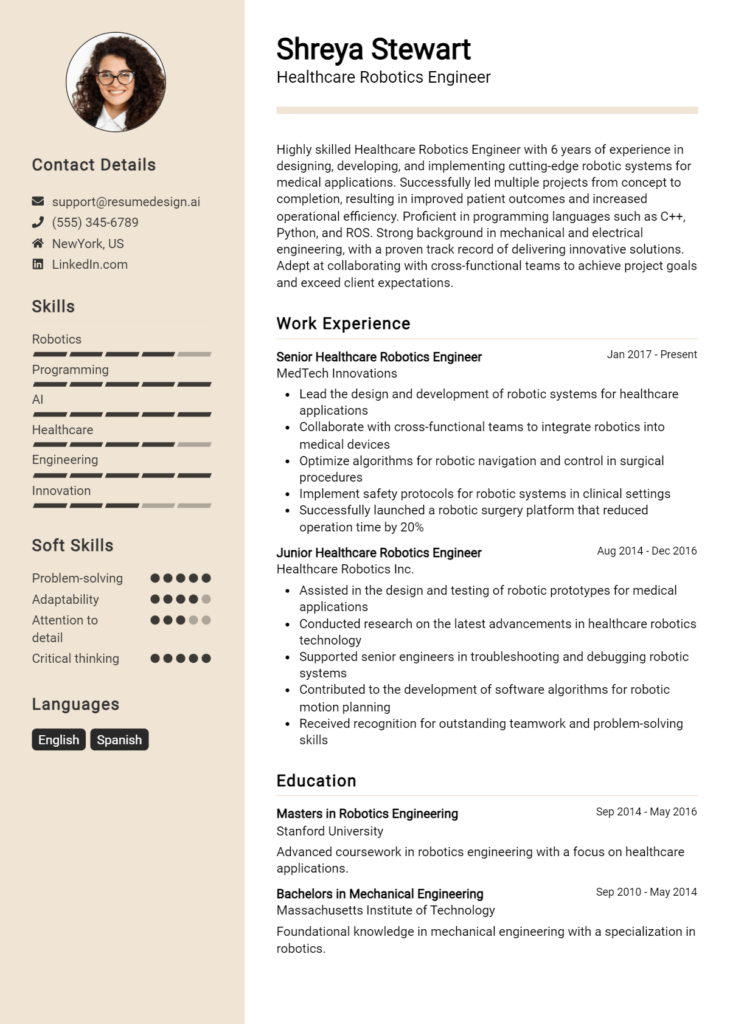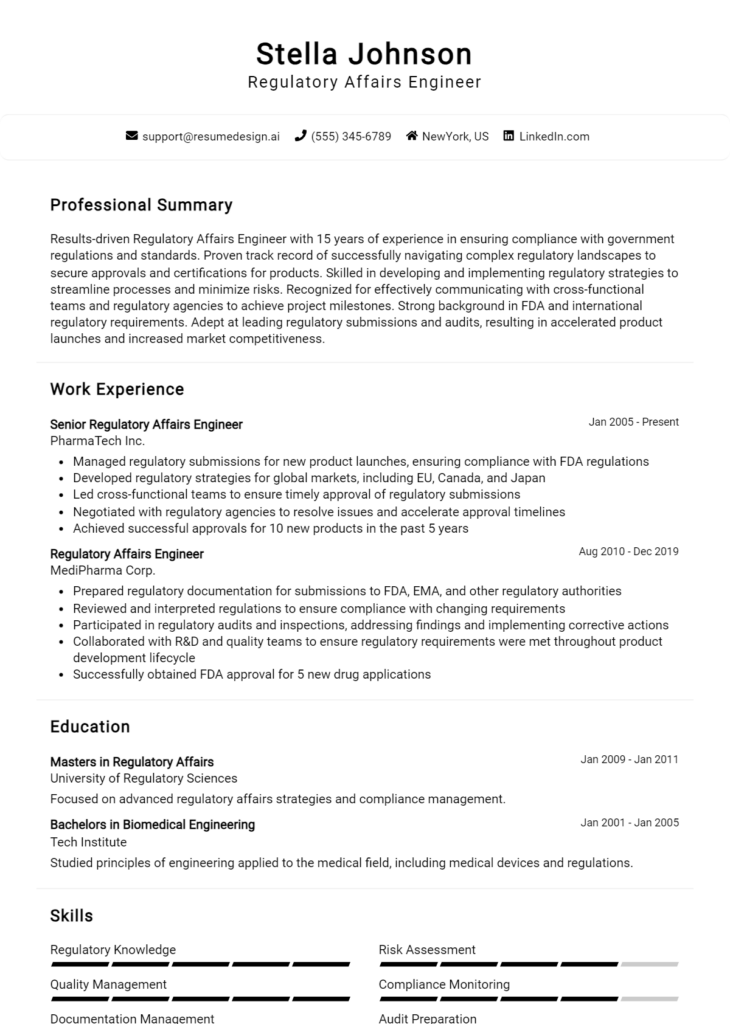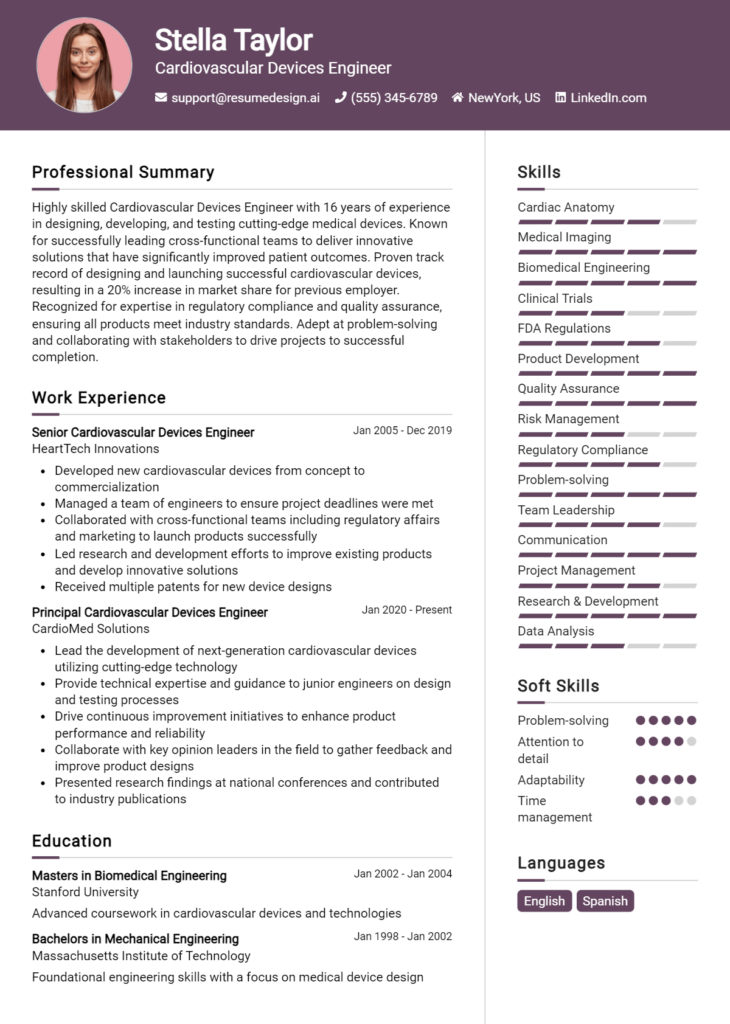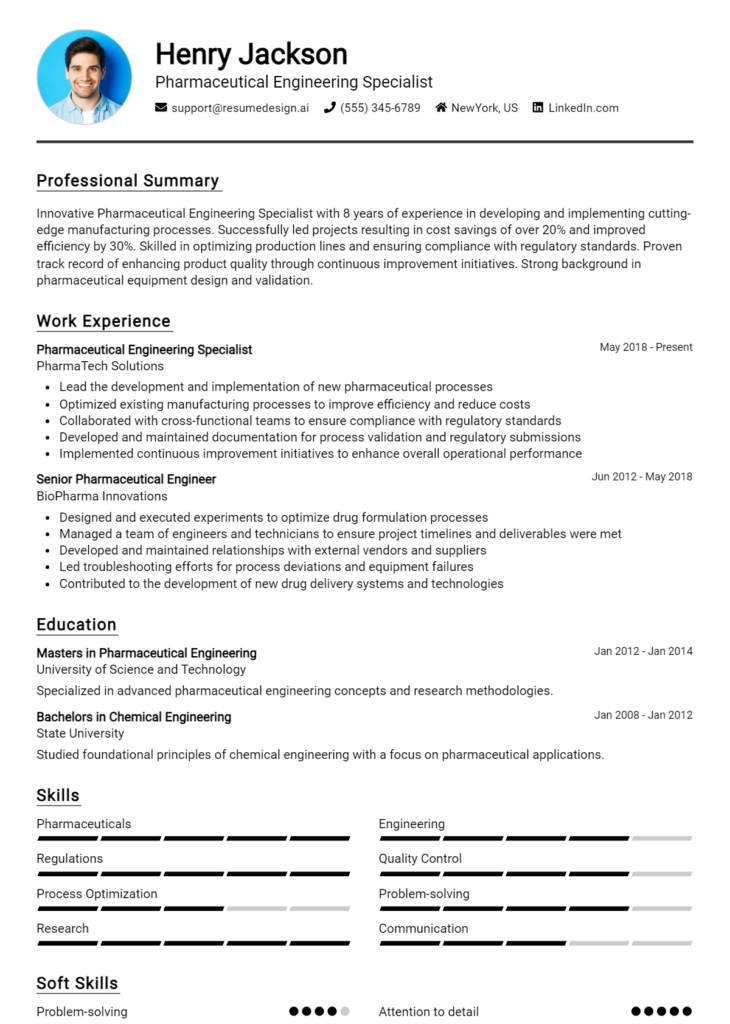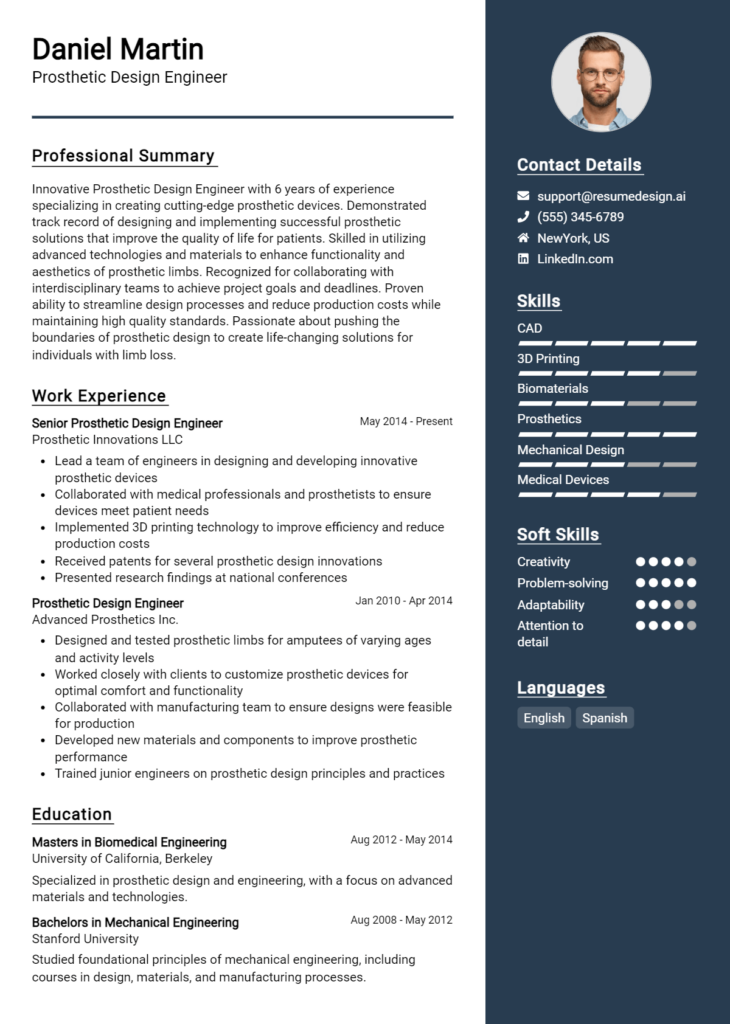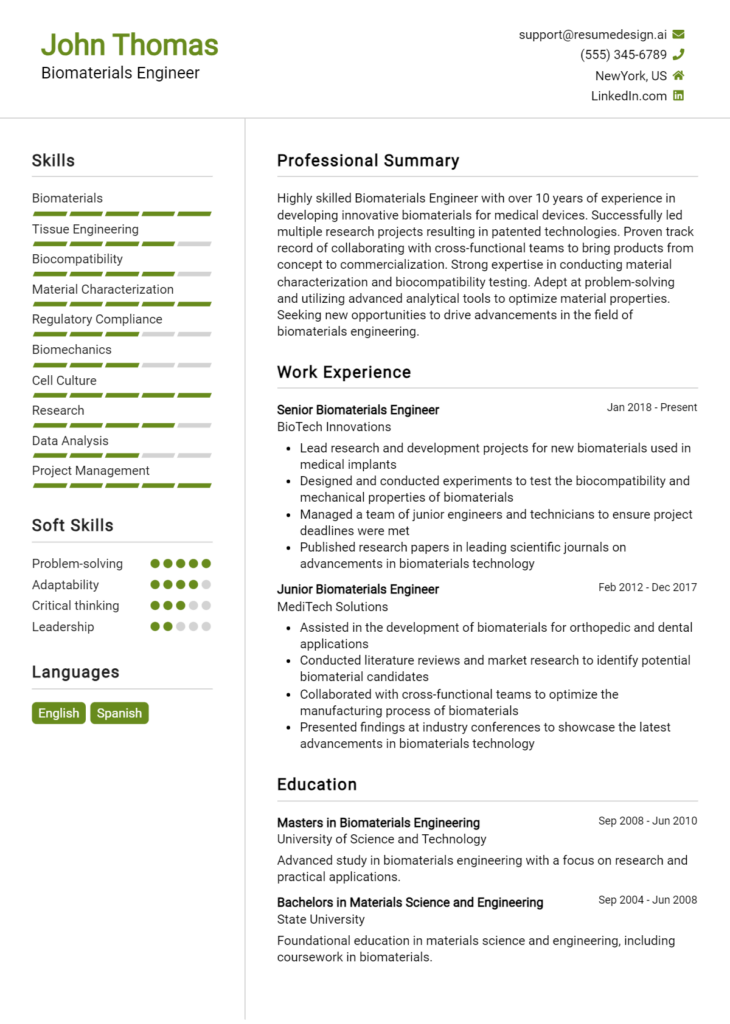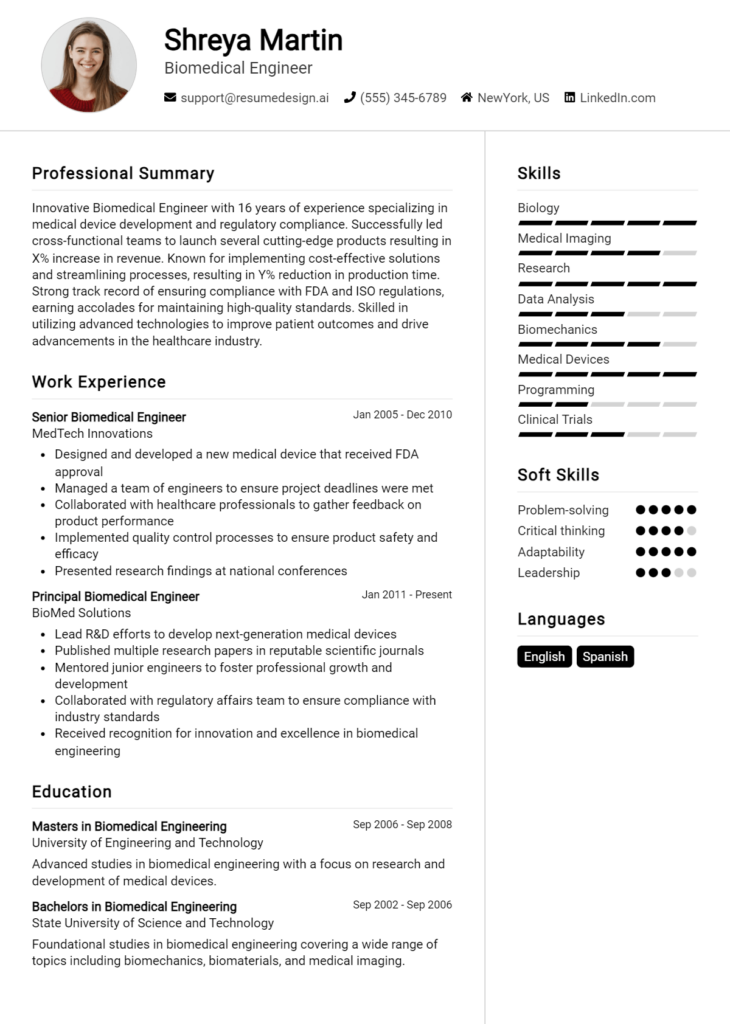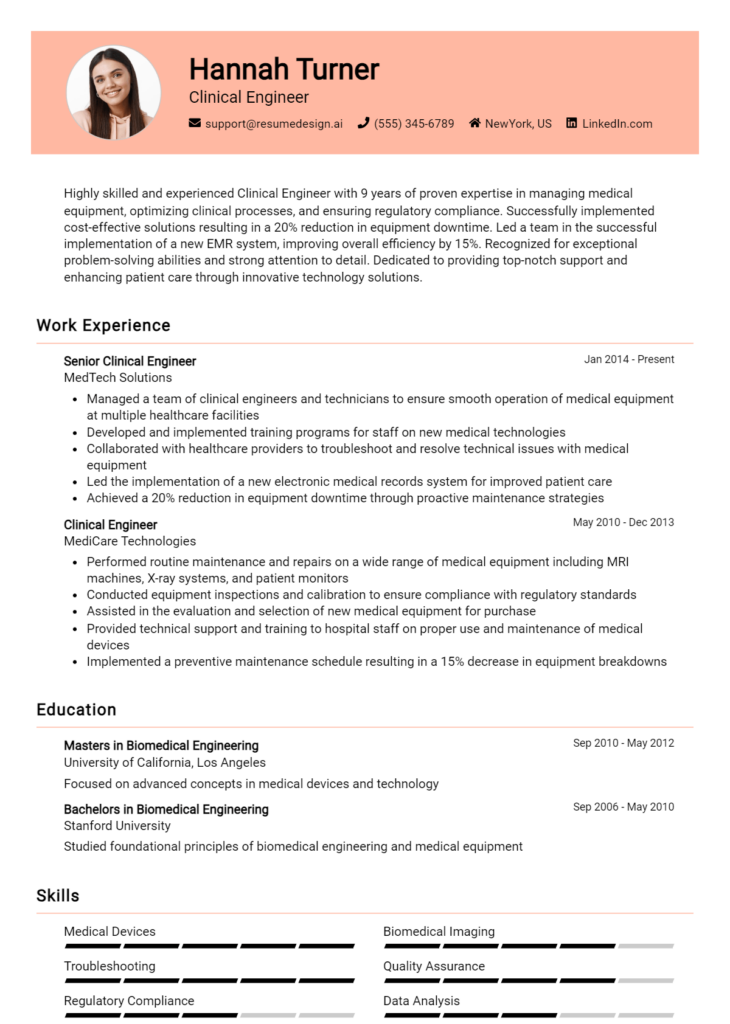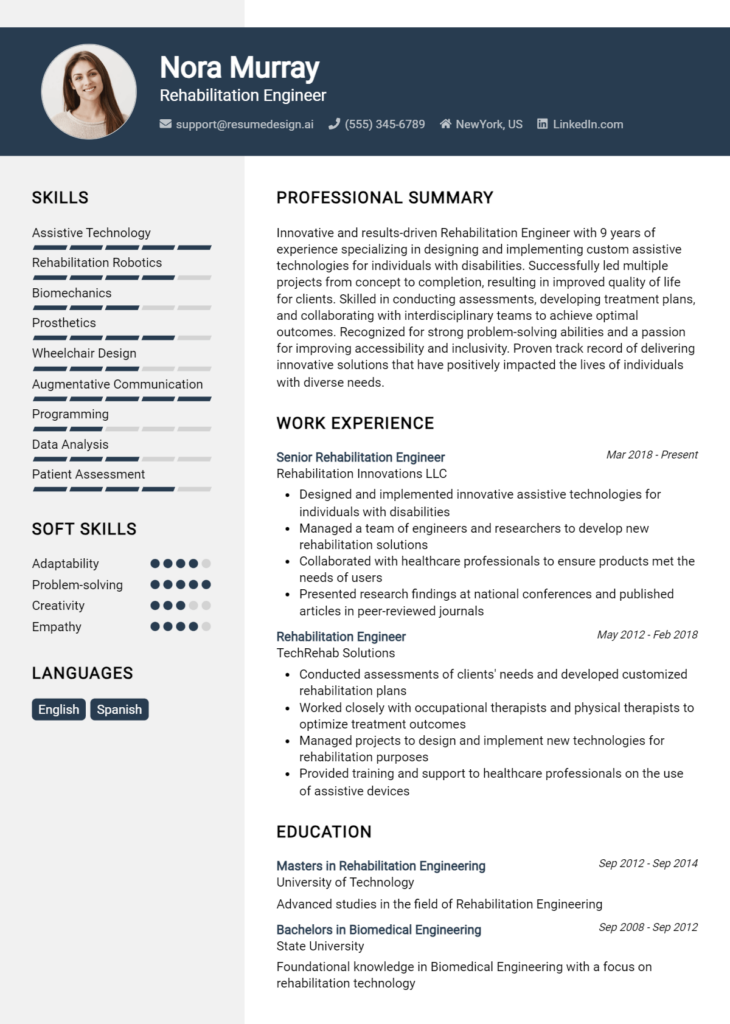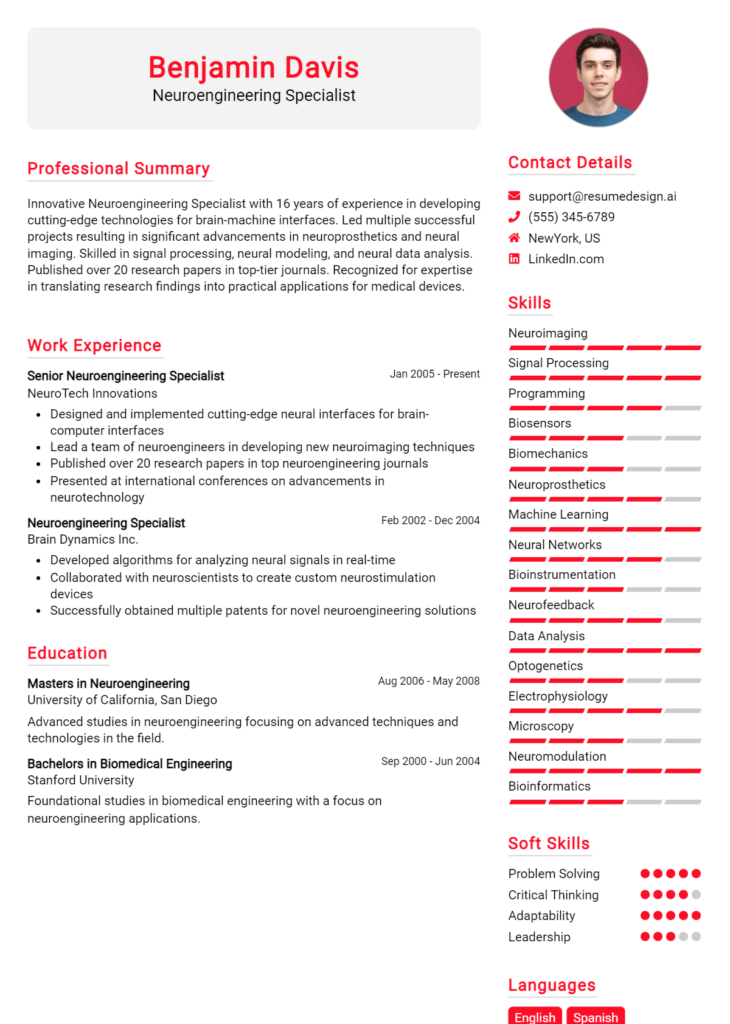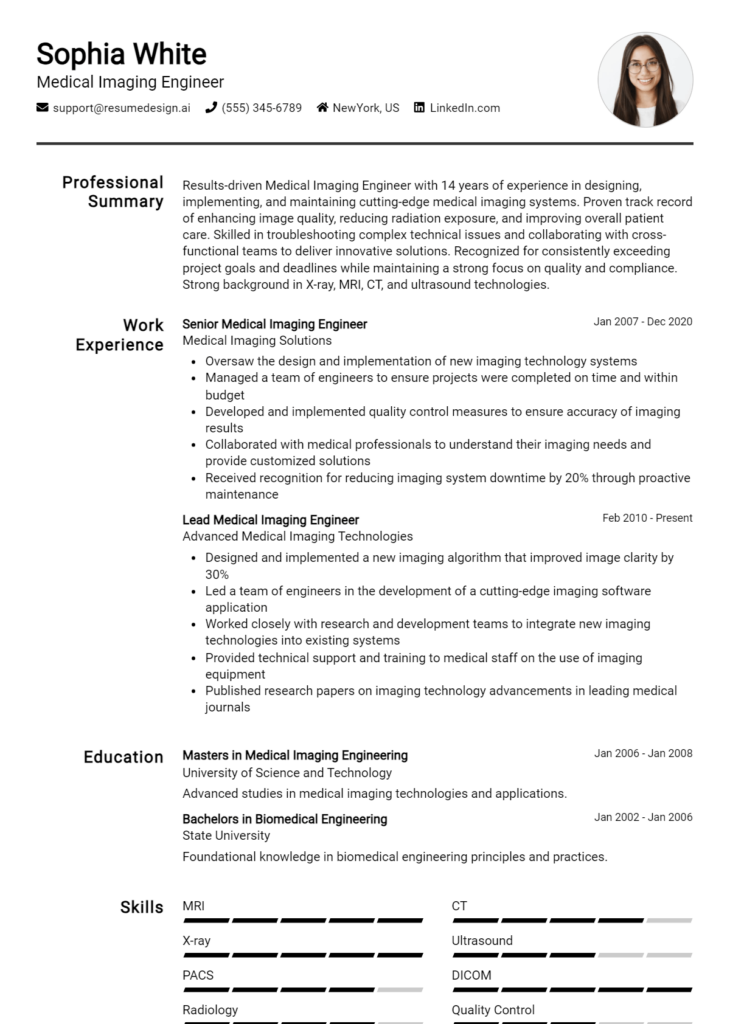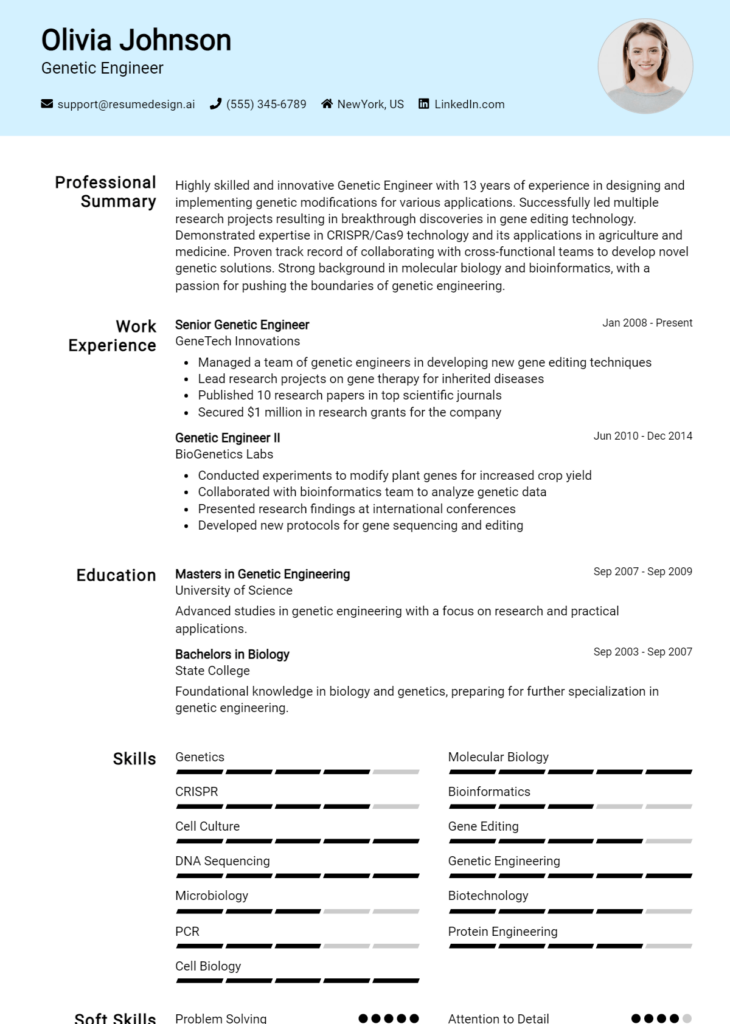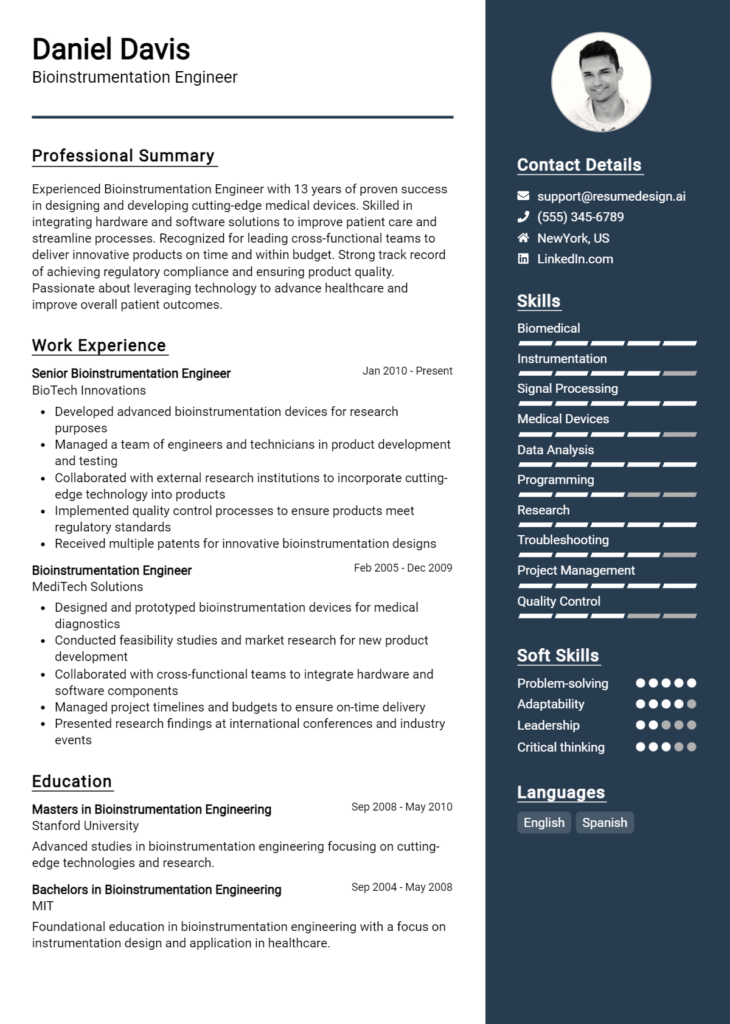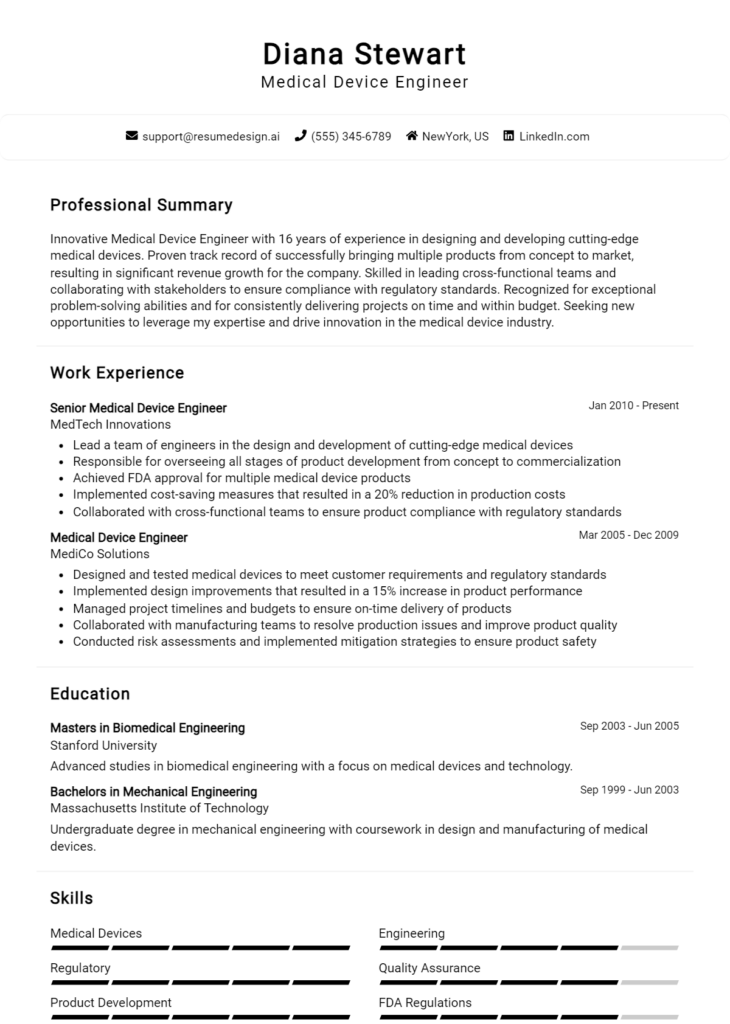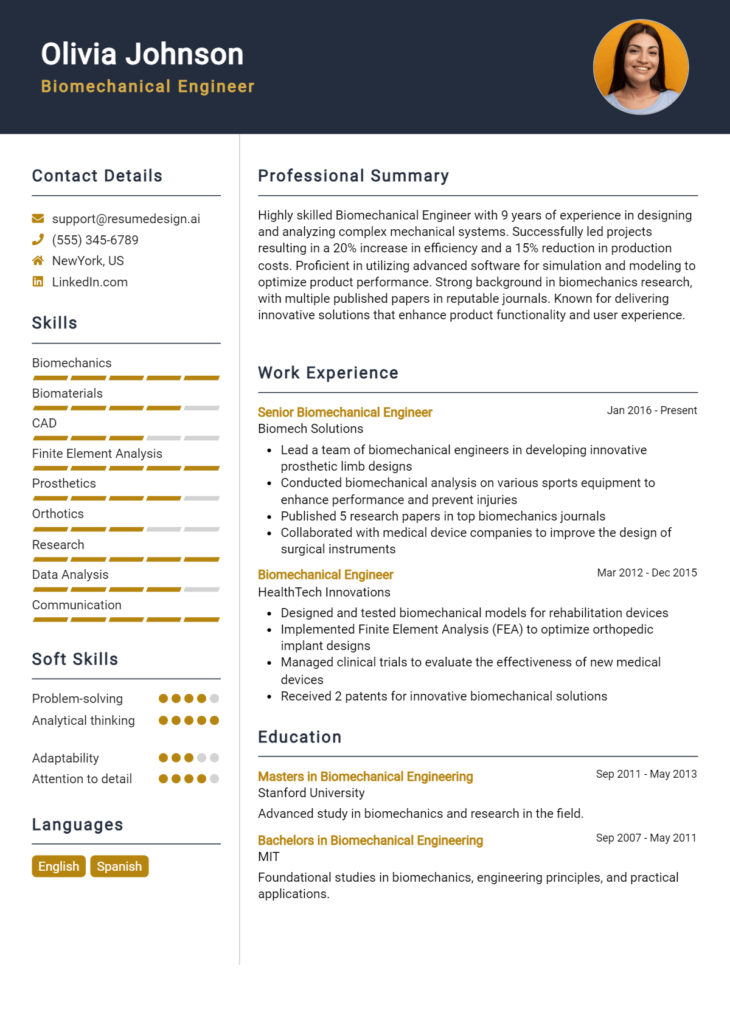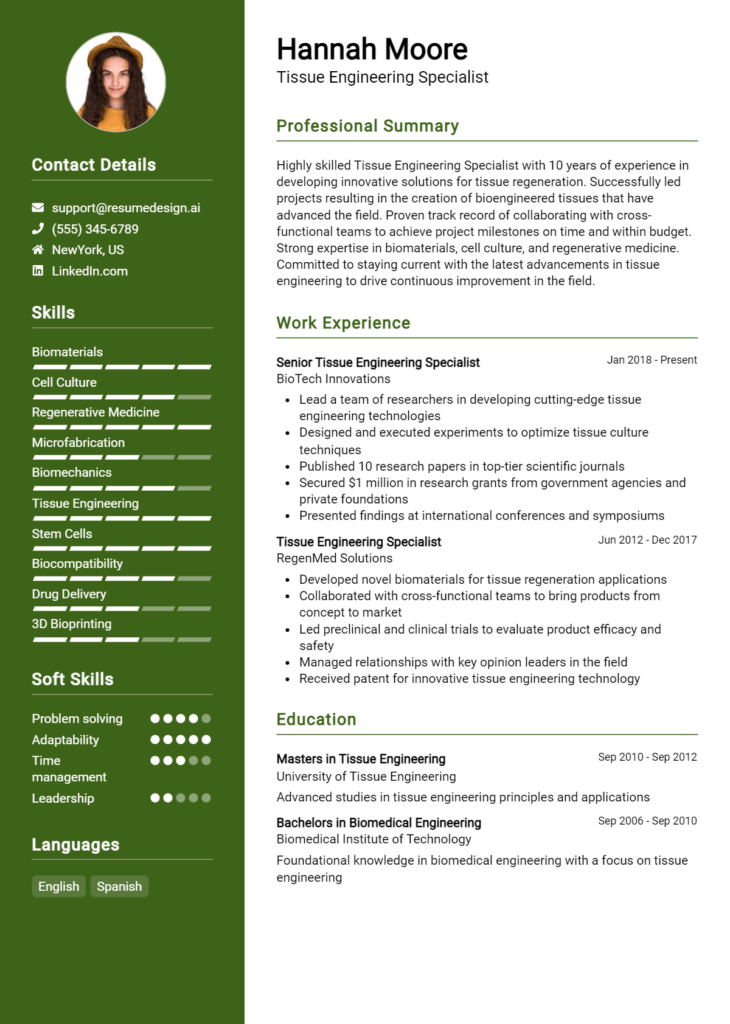Orthopedic Engineer Core Responsibilities
An Orthopedic Engineer plays a pivotal role in designing and developing orthopedic devices and implants, requiring a blend of technical expertise, operational insight, and strong problem-solving abilities. This role effectively bridges engineering, medicine, and manufacturing, collaborating with healthcare professionals to ensure products meet clinical needs. Essential skills include proficiency in biomechanical analysis, CAD software, and material science. A well-structured resume highlighting these qualifications is crucial for showcasing the candidate's contributions to organizational goals and successful project outcomes.
Common Responsibilities Listed on Orthopedic Engineer Resume
- Design and develop orthopedic implants and devices.
- Conduct biomechanical testing and analysis.
- Collaborate with surgeons and medical professionals for product feedback.
- Ensure compliance with medical regulations and standards.
- Participate in product lifecycle management and documentation.
- Develop prototypes and oversee manufacturing processes.
- Conduct research on new materials and technologies.
- Provide technical support to sales and marketing teams.
- Analyze product performance and implement improvements.
- Participate in clinical trials and studies.
- Train healthcare professionals on new products.
- Manage project timelines and budgets effectively.
High-Level Resume Tips for Orthopedic Engineer Professionals
In the highly specialized field of orthopedic engineering, a well-crafted resume is crucial for making a strong first impression on potential employers. Your resume serves as your professional calling card, offering a snapshot of your skills, achievements, and experiences that are relevant to the role. It is essential that your resume not only highlights your technical expertise but also demonstrates your ability to contribute to innovative solutions in orthopedic design and technology. This guide will provide practical and actionable resume tips specifically tailored for orthopedic engineer professionals, ensuring that your application stands out in a competitive job market.
Top Resume Tips for Orthopedic Engineer Professionals
- Tailor your resume for each job application by incorporating keywords and phrases from the job description.
- Highlight relevant experience in orthopedic engineering, including internships, projects, and previous positions.
- Quantify your achievements with specific metrics, such as improved patient outcomes, reduced costs, or enhanced design efficiency.
- Showcase your technical skills, including proficiency in CAD software, biomechanics, materials science, and regulatory compliance.
- Include certifications relevant to the field, such as Certified Biomedical Equipment Technician (CBET) or other professional designations.
- Emphasize teamwork and collaboration by detailing your contributions to multidisciplinary projects.
- Use action verbs to describe your responsibilities and accomplishments, creating a dynamic and engaging narrative.
- Keep your resume concise and focused, ideally within one page, while still providing enough detail to convey your qualifications.
- Incorporate a professional summary or objective statement that clearly articulates your career goals and how they align with the prospective employer's needs.
By implementing these tips, orthopedic engineer professionals can significantly enhance their resumes, thereby increasing their chances of landing a job in this competitive field. A well-structured and tailored resume not only showcases your qualifications but also communicates your enthusiasm and commitment to advancing orthopedic engineering.
Why Resume Headlines & Titles are Important for Orthopedic Engineer
In the competitive field of orthopedic engineering, a well-crafted resume headline or title can serve as a powerful first impression for hiring managers. A strong headline not only captures attention but also succinctly communicates a candidate's key qualifications and unique value proposition in just a few words. It sets the tone for the entire resume, providing a snapshot of the applicant's skills, experience, and alignment with the job role. For orthopedic engineers, where technical expertise and innovation are paramount, an effective headline should be concise, relevant, and directly related to the specific position being applied for, making it a crucial element in the job application process.
Best Practices for Crafting Resume Headlines for Orthopedic Engineer
- Keep it concise, ideally under 10 words.
- Use specific keywords related to orthopedic engineering.
- Highlight your strongest qualifications or unique skills.
- Tailor the headline to the specific job description.
- Avoid jargon or overly technical language that may confuse.
- Focus on measurable achievements when possible.
- Use action words to convey confidence and proactivity.
- Ensure it aligns with the overall tone and content of your resume.
Example Resume Headlines for Orthopedic Engineer
Strong Resume Headlines
Innovative Orthopedic Engineer Specializing in Biomechanical Solutions
Results-Driven Orthopedic Engineer with 5+ Years in Surgical Device Design
Experienced Orthopedic Engineer with Expertise in CAD and Prototyping
Weak Resume Headlines
Engineering Professional Seeking Opportunities
Orthopedic Engineer Looking for a Job
The strong headlines are effective because they clearly articulate the candidate's specific expertise and accomplishments, instantly providing relevant context to hiring managers. They incorporate industry-specific terminology and focus on measurable achievements, making them more impactful. In contrast, the weak headlines fail to impress because they are vague and generic, offering little insight into the candidate's qualifications or how they stand out in a competitive field. This lack of specificity can lead to missed opportunities, as hiring managers may overlook resumes that do not immediately convey a strong candidate profile.
Writing an Exceptional Orthopedic Engineer Resume Summary
A resume summary is a crucial component for an Orthopedic Engineer, as it serves as a brief introduction that encapsulates the candidate's most relevant skills, experiences, and accomplishments. A well-crafted summary not only captures the attention of hiring managers but also provides a snapshot of the candidate's qualifications tailored to the specific job they are applying for. This concise yet impactful statement can significantly enhance the chances of standing out among numerous applicants by immediately highlighting key competencies and achievements pertinent to orthopedic engineering.
Best Practices for Writing a Orthopedic Engineer Resume Summary
- Quantify Achievements: Use numbers to showcase your impact, such as improved patient outcomes or enhanced device performance.
- Focus on Relevant Skills: Highlight specific skills essential for orthopedic engineering, such as biomechanics, CAD proficiency, or regulatory compliance.
- Tailor for the Job: Customize your summary for each application to align with the job description and requirements.
- Be Concise: Keep the summary brief, ideally within 3-5 sentences, making it easy for hiring managers to grasp your qualifications quickly.
- Use Action-Oriented Language: Start sentences with strong action verbs to convey confidence and initiative.
- Highlight Key Accomplishments: Mention notable projects or contributions that demonstrate your expertise and value in the field.
- Showcase Soft Skills: Include interpersonal skills relevant to team collaboration and communication in a clinical setting.
- Maintain Professional Tone: Ensure that the summary reflects professionalism and aligns with the standards of the orthopedic engineering field.
Example Orthopedic Engineer Resume Summaries
Strong Resume Summaries
Dynamic Orthopedic Engineer with over 6 years of experience in developing innovative prosthetic devices, resulting in a 30% improvement in patient mobility. Proven expertise in CAD software and biomechanical analysis, enhancing product design efficiency by 25%.
Results-driven Orthopedic Engineer skilled in 3D modeling and product testing, having successfully led a cross-functional team on a project that reduced production costs by 15% while maintaining compliance with FDA regulations.
Dedicated Orthopedic Engineer with a track record of optimizing surgical tools and implants, achieving a 40% decrease in post-operative complications through rigorous quality assurance processes and collaborative research initiatives.
Weak Resume Summaries
Orthopedic Engineer with some experience in the field. I have worked on various projects and am familiar with engineering principles.
Motivated engineer seeking opportunities in orthopedic engineering. I am a team player and can learn new skills quickly.
The strong resume summaries demonstrate clear, quantifiable achievements and specific skills that directly relate to the orthopedic engineering role, effectively showcasing the candidate's suitability for the position. In contrast, the weak summaries lack detail, fail to highlight specific accomplishments, and are overly generic, making it difficult for hiring managers to gauge the candidate's true potential and relevance to the job.
Work Experience Section for Orthopedic Engineer Resume
The work experience section of an Orthopedic Engineer resume is vital as it gives potential employers insight into a candidate's technical skills and their ability to manage teams while delivering high-quality orthopedic products. This section not only highlights a candidate's hands-on experience with medical devices and technologies but also demonstrates their capability to lead projects and collaborate with cross-functional teams. Quantifying achievements, such as successful project completions, innovations that led to improved patient outcomes, or cost reductions, is crucial to making a strong impression. Aligning past experiences with industry standards further reinforces the candidate's qualifications and readiness for the role.
Best Practices for Orthopedic Engineer Work Experience
- Highlight specific technical skills relevant to orthopedic engineering, such as CAD software proficiency or knowledge of biomaterials.
- Use quantifiable achievements to demonstrate the impact of your work, such as percentage improvements in product performance or successful project completion rates.
- Emphasize leadership roles or responsibilities in managing teams or guiding projects to show your capability for collaboration.
- Align your experiences with industry standards and practices to reflect familiarity with current technologies and methodologies.
- Include keywords from the job description to ensure your resume passes through Applicant Tracking Systems (ATS).
- Focus on outcomes and results, describing how your contributions directly benefited the organization or patients.
- Tailor your work experience to the specific job you are applying for, emphasizing the most relevant experiences.
- Maintain a clear and professional format to enhance readability and make a strong first impression.
Example Work Experiences for Orthopedic Engineer
Strong Experiences
- Led a cross-functional team in the development of a new knee implant, reducing production costs by 15% while enhancing durability, resulting in a 25% increase in sales.
- Successfully designed and tested a novel orthopedic device that improved post-operative recovery times by 30% based on clinical trial results.
- Managed the implementation of a new quality assurance process that decreased product defects by 40%, ensuring compliance with FDA regulations.
- Collaborated with surgeons and healthcare professionals to gather feedback and refine product designs, enhancing user satisfaction ratings by 20%.
Weak Experiences
- Worked on medical device projects.
- Assisted in engineering tasks.
- Helped with quality control.
- Participated in team meetings.
The examples categorized as strong experiences stand out due to their specificity, quantifiable results, and demonstrated leadership and collaboration. They clearly outline the candidate's role and the impact of their contributions on the organization and its products. In contrast, the weak experiences lack detail and measurable outcomes, making them less compelling and failing to showcase the candidate's true potential or expertise in orthopedic engineering.
Education and Certifications Section for Orthopedic Engineer Resume
The education and certifications section of an Orthopedic Engineer resume is crucial as it serves to highlight the candidate’s academic foundation, industry-relevant qualifications, and commitment to ongoing professional development. This section not only showcases essential degrees and certifications but also emphasizes any specialized training and relevant coursework that aligns with the demands of the role. By providing comprehensive details on their educational background, candidates can enhance their credibility and demonstrate their alignment with the specific requirements of orthopedic engineering, thereby making a stronger case for their candidacy.
Best Practices for Orthopedic Engineer Education and Certifications
- Prioritize relevant degrees such as a Bachelor's or Master's in Biomedical Engineering or Mechanical Engineering.
- Include industry-recognized certifications, such as Certified Biomedical Equipment Technician (CBET) or Certified Orthopedic Technologist (OTC).
- Highlight coursework that directly relates to orthopedic engineering, biomechanics, or medical device design.
- Keep the information organized and easy to read, using bullet points for clarity.
- Consider the inclusion of ongoing education, such as workshops or online courses, to showcase continuous learning.
- Tailor the section to reflect the specific requirements of the job description to enhance relevance.
- Use clear dates for certifications and degrees to demonstrate currency and relevance in the field.
- Provide context for any specialized training programs or internships that are pertinent to orthopedic engineering.
Example Education and Certifications for Orthopedic Engineer
Strong Examples
- Bachelor of Science in Biomedical Engineering, University of XYZ, 2020
- Certified Orthopedic Technologist (OTC), National Board for Certification of Orthopedic Technologists, 2021
- Relevant Coursework: Biomechanics, Medical Device Design, Rehabilitation Engineering
- Master of Science in Mechanical Engineering with a focus on Orthopedic Devices, University of ABC, 2022
Weak Examples
- Associate Degree in General Studies, Community College, 2018
- Certification in Basic First Aid, Red Cross, 2019
- Online Course: Introduction to Computer Science, 2020
- High School Diploma, Anytown High School, 2016
The strong examples presented highlight relevant degrees, certifications, and coursework that directly align with the requirements of an Orthopedic Engineer. They emphasize specialized education and credentials that enhance the candidate's suitability for the role. Conversely, the weak examples illustrate educational qualifications and certifications that are either outdated or unrelated to the field, which could detract from the candidate's overall credibility and alignment with the job requirements.
Top Skills & Keywords for Orthopedic Engineer Resume
In the highly specialized field of orthopedic engineering, a well-crafted resume is essential for showcasing your qualifications and making a lasting impression on potential employers. Highlighting both hard and soft skills is crucial, as these elements reflect not only your technical expertise but also your ability to work effectively in a team-oriented environment. The right combination of skills can differentiate you from other candidates, demonstrating your ability to contribute to innovative solutions in orthopedic device design and manufacturing. By focusing on the appropriate competencies, you can create a compelling narrative that aligns with industry demands and enhances your work experience.
Top Hard & Soft Skills for Orthopedic Engineer
Soft Skills
- Strong communication abilities
- Team collaboration and leadership
- Problem-solving mindset
- Critical thinking
- Attention to detail
- Time management
- Adaptability
- Creativity and innovation
- Empathy and patient-centric approach
- Conflict resolution
Hard Skills
- Proficiency in CAD software (e.g., SolidWorks, AutoCAD)
- Knowledge of biomechanics and material science
- Experience with finite element analysis (FEA)
- Understanding of manufacturing processes
- Familiarity with regulatory standards (e.g., FDA, ISO)
- Prototyping and testing methodologies
- Data analysis and interpretation
- Project management skills
- Familiarity with orthopedic implant design
- Research and development expertise
By emphasizing these skills in your resume, you will effectively convey your qualifications as an orthopedic engineer, showcasing your ability to meet the challenges of this dynamic and rewarding field.
Stand Out with a Winning Orthopedic Engineer Cover Letter
Dear Hiring Manager,
I am writing to express my interest in the Orthopedic Engineer position at [Company Name], as advertised on [where you found the job listing]. With a solid educational background in biomedical engineering and over [X years] of experience in orthopedic device design and development, I am excited about the opportunity to contribute to your team. My passion for improving patient outcomes through innovative orthopedic solutions aligns perfectly with [Company Name]’s commitment to advancing healthcare technology.
In my previous role at [Previous Company Name], I successfully led a project focused on the development of a new generation of orthopedic implants. This experience honed my skills in product design, prototyping, and testing, allowing me to collaborate effectively with cross-functional teams, including surgeons and material scientists. By applying advanced modeling techniques and adhering to regulatory standards, I was able to streamline the design process and reduce time-to-market, ultimately enhancing the product's clinical performance. I am particularly proud of achieving a [specific achievement or recognition], which demonstrates my ability to drive results under tight deadlines.
At [Company Name], I am eager to leverage my technical expertise and innovative mindset to further the development of groundbreaking orthopedic solutions. I am particularly impressed by your recent advances in [specific technology or project related to the company], and I am excited about the prospect of contributing my knowledge in biomechanics and materials science to enhance these initiatives. My proactive approach to problem-solving and my commitment to continuous learning make me a valuable addition to your team.
Thank you for considering my application. I look forward to the opportunity to discuss how my experiences and vision align with [Company Name]’s goals. Please feel free to contact me at [your phone number] or [your email address] to schedule a discussion. I am excited about the possibility of contributing to your esteemed organization and am eager to bring innovative solutions to the field of orthopedics.
Sincerely,
[Your Name]
Common Mistakes to Avoid in a Orthopedic Engineer Resume
When crafting a resume for an orthopedic engineer position, it's essential to present your qualifications and experiences in a clear and compelling manner. However, many candidates make common mistakes that can detract from their overall appeal to potential employers. By avoiding these pitfalls, you can enhance your resume and increase your chances of landing an interview. Here are some common mistakes to watch out for:
Neglecting Tailoring: Failing to customize your resume for the specific job posting can lead to missed opportunities. Employers look for relevant skills and experiences that align with their needs.
Using Technical Jargon Excessively: While it's important to showcase your technical expertise, overloading your resume with jargon can confuse hiring managers who may not be familiar with all terminology. Aim for clarity and balance.
Poor Formatting: A cluttered or unorganized layout can make your resume difficult to read. Utilize clear headings, bullet points, and consistent font styles to enhance readability.
Omitting Soft Skills: Technical skills are crucial, but soft skills like teamwork, communication, and problem-solving are equally important in orthopedic engineering. Highlight these attributes to present a well-rounded profile.
Listing Responsibilities Instead of Achievements: Simply listing job duties doesn't demonstrate your impact. Focus on quantifiable achievements that illustrate your contributions and successes in previous roles.
Lack of Keywords: Many companies use applicant tracking systems (ATS) to filter resumes. Failing to include relevant keywords from the job description can result in your resume being overlooked.
Inconsistent Employment Dates: Ensure that your employment dates are accurate and consistent throughout your resume. Discrepancies can raise red flags for potential employers.
Ignoring Proofreading: Spelling and grammatical errors can undermine your professionalism. Always thoroughly proofread your resume, or have someone else review it to catch any mistakes before submission.
Conclusion
As we’ve explored throughout this article, the role of an Orthopedic Engineer is critical in the development and enhancement of medical devices and technologies that improve patient mobility and quality of life. Key responsibilities include designing orthopedic implants, collaborating with healthcare professionals, and ensuring compliance with regulatory standards. Additionally, staying updated on the latest advancements in materials and techniques is essential for success in this rapidly evolving field.
If you're preparing to enter this exciting career or looking to advance within it, it's vital to have a standout resume that effectively showcases your skills and experiences. Take a moment to review your Orthopedic Engineer resume and ensure it reflects your qualifications accurately.
To assist you in this process, consider utilizing the variety of resources available: explore resume templates to find a layout that suits your style, use the resume builder for a streamlined creation process, check out resume examples for inspiration, and don’t forget to craft a compelling cover letter with the help of cover letter templates.
Now is the time to take action and refine your resume to ensure you make a strong impression in the field of orthopedic engineering!

